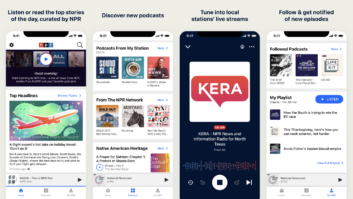This is the text of a press release from National Public Radio dated Oct. 15, 2003. It addresses the recent Mitre Corp. report to the FCC on the topic of low-power FM service.
Washington, DC – NPR has filed comments with the Federal Communications Commission (FCC) on the field study of Low Power FM (LPFM) interference to third adjacent channel full power and translator stations conducted by the Mitre Corporation and Comsearch. NPR supports a trial implementation of LPFM stations on third adjacent channels subject to application processing and interference remediation safeguards we describe in our filing.
Throughout this proceeding, NPR has supported the principles of localism and diversity of ownership reflected in the LPFM service, and we have consistently affirmed our belief that LPFM can coexist in a complementary, compatible way with America’s public radio stations and radio reading services. Given the potential for adjacent channel interference, NPR has called for appropriate testing and safeguards to assure the protection of existing public radio services, including vital radio reading services for the blind. The field tests conducted by Mitre and Comsearch, though flawed in a number of respects, provide a basis to proceed in a measured way to authorize third adjacent LPFM stations.
In the case of radio reading services, however, flaws in the how the study was conducted are fatal to its conclusion that 100 watt LPFM stations can be authorized on third adjacent channels to stations that carry radio reading services without materially impairing the reading service. Accordingly, we encourage the Commission and the Congress to grant the same protections in the future for radio stations providing radio reading services that are provided today.
We believe that the best way for policy makers to implement LPFM is to begin with a measured trial period of interim LPFM service introduction. We believe such a trial period would be important in documenting the successful strategies of interference remediation and avoidance where it counts – in the real world; and, will greatly benefit all listeners who value public and community radio.
As broadcasters providing local programming and services to more than 30 million Americans, NPR’s member stations believe the public interest would be served by more NCE services, including highly localized ones, so long as the new services fit into the current fabric of radio signals. It is especially important to protect the radio reading services that reach more than a million regular listeners, and radio translators now bringing public radio to millions of Americans in rural areas. We are hopeful that the safeguards NPR suggested can bridge the gap between the Mitre Study and full-scale authorization of third adjacent channel 100 watt LPFM stations.










